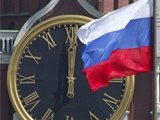|
|
TODAY.AZ / Politics
Why would the Kremlin prefer war?
02 October 2008 [12:58] - TODAY.AZ
 About ten days ago one of the high ranking officials of the presidential administrations voiced Baku's disappointment in western partners in public: "We have done everything for America and Europe and we could not get at least a fair position on the Karabakh issue in exchange. Now we will not assume the bargain of Nabucco. Let those, who need it, assume the responsibility",
About ten days ago one of the high ranking officials of the presidential administrations voiced Baku's disappointment in western partners in public: "We have done everything for America and Europe and we could not get at least a fair position on the Karabakh issue in exchange. Now we will not assume the bargain of Nabucco. Let those, who need it, assume the responsibility",Certainly, it is not the complete denial of the "Euroatlantic" goals, but it looks like the next step in our flirting with Moscow since the moment of resumption of the Russian-Georgian conflict in August. Baku either really considers, or wants to show to the West that by obtaining final agreements with Moscow, it is possible to settle the main problem, concerning our country - the Karabakh conflict.
For the first time through so many years Moscow displayed a real interest for resolution: it wants to look like a country, bringing peace to the region and not only war. A greater interest is now displayed to the resolution based on the territorial integrity of Azerbaijan: by defining the fate of the transcaspian gas pipeline, Russia would make its own transformation into almost a monopoly on the European gas market inevitable with all well-known political gains. At the same time, the West would mainly lose its interest in Georgia and Armenia would have no alternative to alliance with Russia.
However, the Kremlin can hardly realize this interest. While communicating with us, Moscow is protracting time in order not to be expelled from the South Caucasus forever. And now we hear from Russian commentators that the Karabakh conflict has been "neglected" so much that peaceful process would take time. If Moscow feels that it will be able to restore the international reputation, lost following the military adventure in Georgia, the resumption of the anti-Azerbaijani rhetorics would not take time. While actions - encouragement of the continuation of the Armenian occupation of Karabakh - have not been stopped yet.
For already several years, Moscow is searching for ways of application of the instruments of "soft force" to influence the public opinion in Azerbaijan: these are programs of academical, student and cultural exchange, encouragement of Russian language and so on. When this attempt was launched I told the Russian representatives that this is in vain for Azerbaijan knows well whom Russia supported in Karabakh conflict. The instruments of "soft policy" can be decisive only when there is not such a negative history. It seems that at that time Muscovites decided to ignore Azerbaijan's public opinion and use these tools only for the political elite of Baku.
In the result, we witness the spreading of naive expectations that Moscow prepares to help Azerbaijan in the Karabakh issue. Moreover, we see how effective is the spreading of the anti-Turkish rumors, direct and indirect propaganda of anti-western moods in the Azerbaijani society.
In fact, we do not have to expect that Moscow would take reasonable decisions, profitable for us. It will just try to consolidate its status of "a neutral" side in the Karabakh conflict and will incite this conflict again for the main purpose of the military operation in Georgia has not been attained: the Kremlin failed in breaking the perspective energy chain "East-West", which is to bring Turkmen gas and Kazakh oil to the world markets, bypassing Russia,i n Georgia. It means that it should be broken in Azerbaijan and Russia must seem "neutral".
Ilgar Mamedov
Political scientist
URL: http://www.today.az/news/politics/47914.html
 Print version
Print version
Views: 2439
Connect with us. Get latest news and updates.
See Also
- 07 February 2026 [13:27]
Washington may hold Gaza Board of Peace meeting this month - 07 February 2026 [13:03]
Bayramov, Pakistan’s FM discuss security, condemn terrorism in phone call - 07 February 2026 [11:20]
Washington agreement boosts central corridor’s strategic role, EU-backed study says - 07 February 2026 [10:55]
Azerbaijan highlights social toll of conflicts at UN Commission on Social Development - 06 February 2026 [11:54]
President Ilham Aliyev receives delegation led by Iranian Minister of Defense and Armed Forces - 05 February 2026 [14:46]
Armenian citizen Madat Babayan sentenced to 19 years over Khojaly genocide - 05 February 2026 [14:14]
India has failed Iran and Armenia - competition with the Middle Corridor will not take place - 05 February 2026 [11:11]
Azerbaijan and Armenia in Abu Dhabi - how one leader changed world - 05 February 2026 [10:25]
Footage of Zayed Award for Human Fraternity ceremony posted on President Ilham Aliyev's social media accounts - 04 February 2026 [13:13]
Armenian emblem with two heads
Most Popular
 Zelenskyy claims US gave Ukraine and Russia a deadline to reach peace agreement
Zelenskyy claims US gave Ukraine and Russia a deadline to reach peace agreement
 President Ilham Aliyev receives delegation led by Iranian Minister of Defense and Armed Forces
President Ilham Aliyev receives delegation led by Iranian Minister of Defense and Armed Forces
 Int'l Mugham Center holds magnificent concert
Int'l Mugham Center holds magnificent concert
 Epstein files expose deeper ties with global scientific elite
Epstein files expose deeper ties with global scientific elite
 Azerbaijan National Carpet Museum opens ‘Silent Prayers’ Exhibition
Azerbaijan National Carpet Museum opens ‘Silent Prayers’ Exhibition
 Gilavar Photo Club launches 'My Urban World' Int'l Photography Competition
Gilavar Photo Club launches 'My Urban World' Int'l Photography Competition
 Trump condemns, won't apologise for video depicting Obamas as apes
Trump condemns, won't apologise for video depicting Obamas as apes
